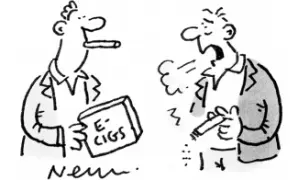 One of the main architects of the World Health Organization’s Framework Convention on Tobacco Control (WHO FCTC) has expressed his strong support for e-cigarettes, starkly separating himself from the position adopted by the FCTC at its Moscow summit last year.
One of the main architects of the World Health Organization’s Framework Convention on Tobacco Control (WHO FCTC) has expressed his strong support for e-cigarettes, starkly separating himself from the position adopted by the FCTC at its Moscow summit last year.
Writing in the right-wing British magazine The Spectator, Derek Yach says that “unsupported statements are accepted as truth by policymakers and are used as the basis for stringent regulation of e-cigs in many jurisdictions. This may well end up causing more public health harm than good.”
He also singles out article 5.3 of the FCTC, which discourages governments from involving the tobacco industry in the policy-making process, for particular criticism.
“This policy is impossible to implement in countries where democratic law-making processes require interaction with all stakeholders, or where the government owns a tobacco company,” he writes. “Moreover, it limits the potential to make use of scientific discoveries by tobacco companies. That effectively means not talking to researchers developing new and safer products.”
Yach believes that tobacco companies are “hedging their bets” and need to affirm their seriousness about e-cigarettes more overtly. But, he adds, “we should praise ‘good’ e-cig companies who commit to safety, to avoiding youth marketing, and to making smoking obsolete”.
Among specific proposals, he suggests that “retailers should voluntarily withdraw cigarettes from stores, or at least reduce their prominence, in favour of e-cigs and NRTs [nicotine replacement therapies]”. He also says life insurers should not treat vapers as smokers.
Yach, a trained doctor from South Africa who became a specialist in health policy, headed the WHO’s Tobacco Free Initiative during the drafting of the FCTC in the late 1990s and early 2000s.
He is now senior vice-president at The Vitality Institute, a health research organisation funded by South African health insurance company Discovery.
The WHO FCTC meeting in October last year, known as COP6, produced a raft of recommendations – which are not binding on signatory nations but will be influential – including the banning of e-cig ads. It also implicitly supported restrictions on vaping in public places, and referred to complete prohibition of e-cigs as a policy option.
Nearly all major countries, with the notable exception of the U.S., are signatories to the FCTC.
What This Means: While the vaping world will rejoice at Yach’s support, the reality is that his words – especially in the libertarian and small-circulation Spectator – will not carry nearly as much weight as the aspersions cast on e-cigarettes in some weightier medical journals.
Still, Yach is a rather surprising addition to the pro-e-cig camp – and the unexpectedness of his voice may at least cause some to sit up and listen.
– Barnaby Page ECigIntelligence staff
Illustration: The Spectator







